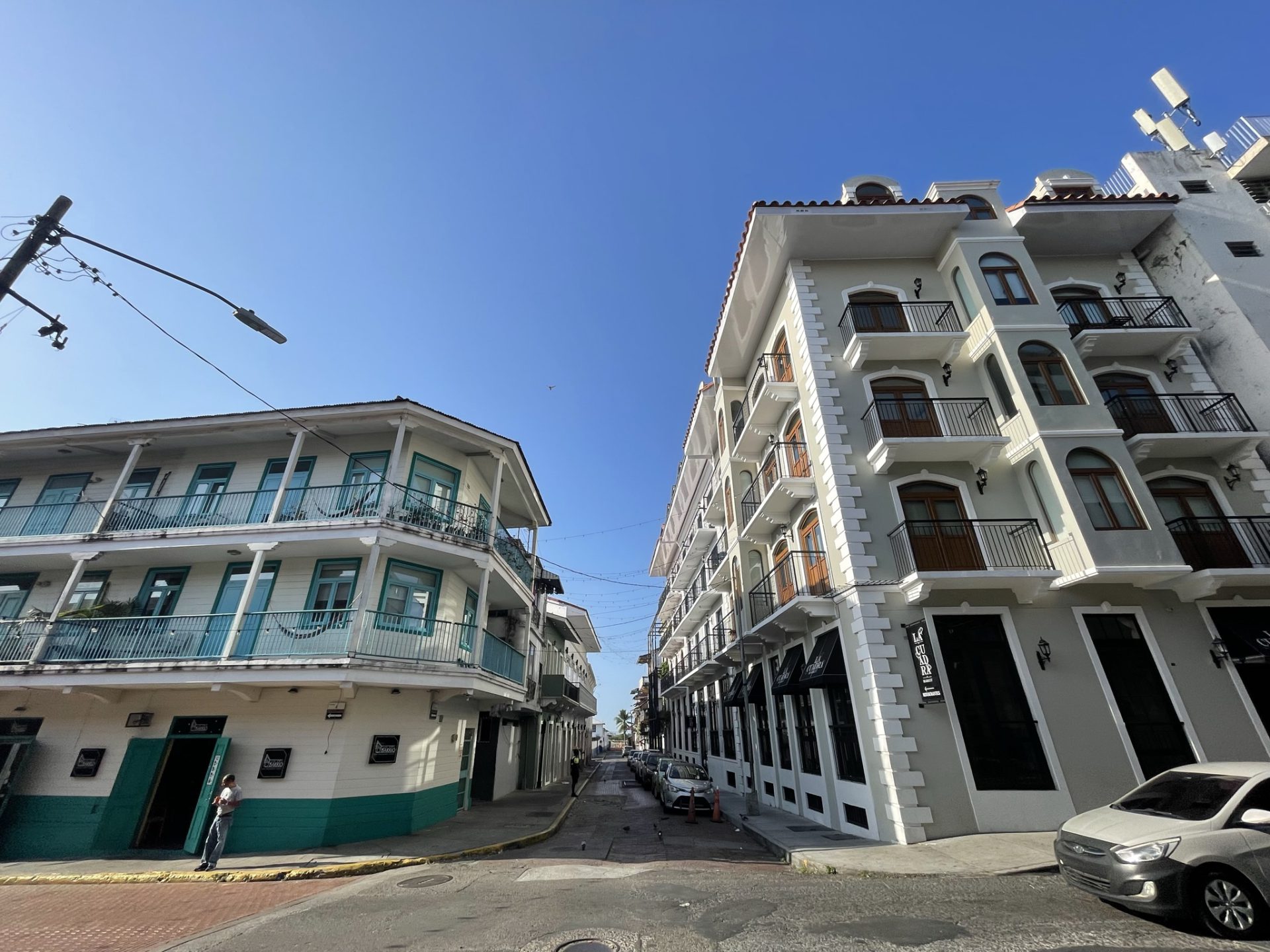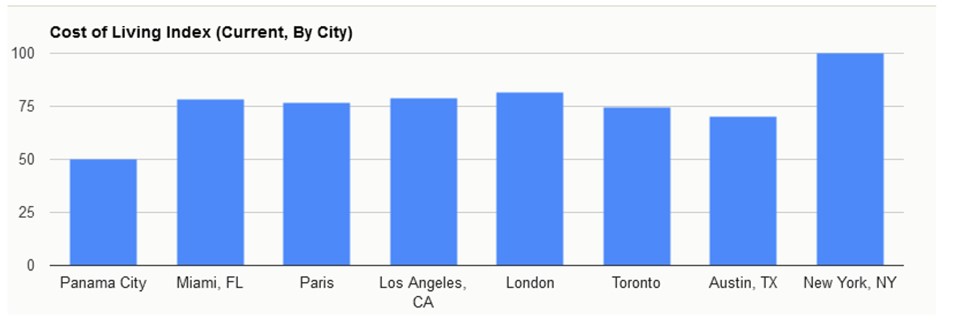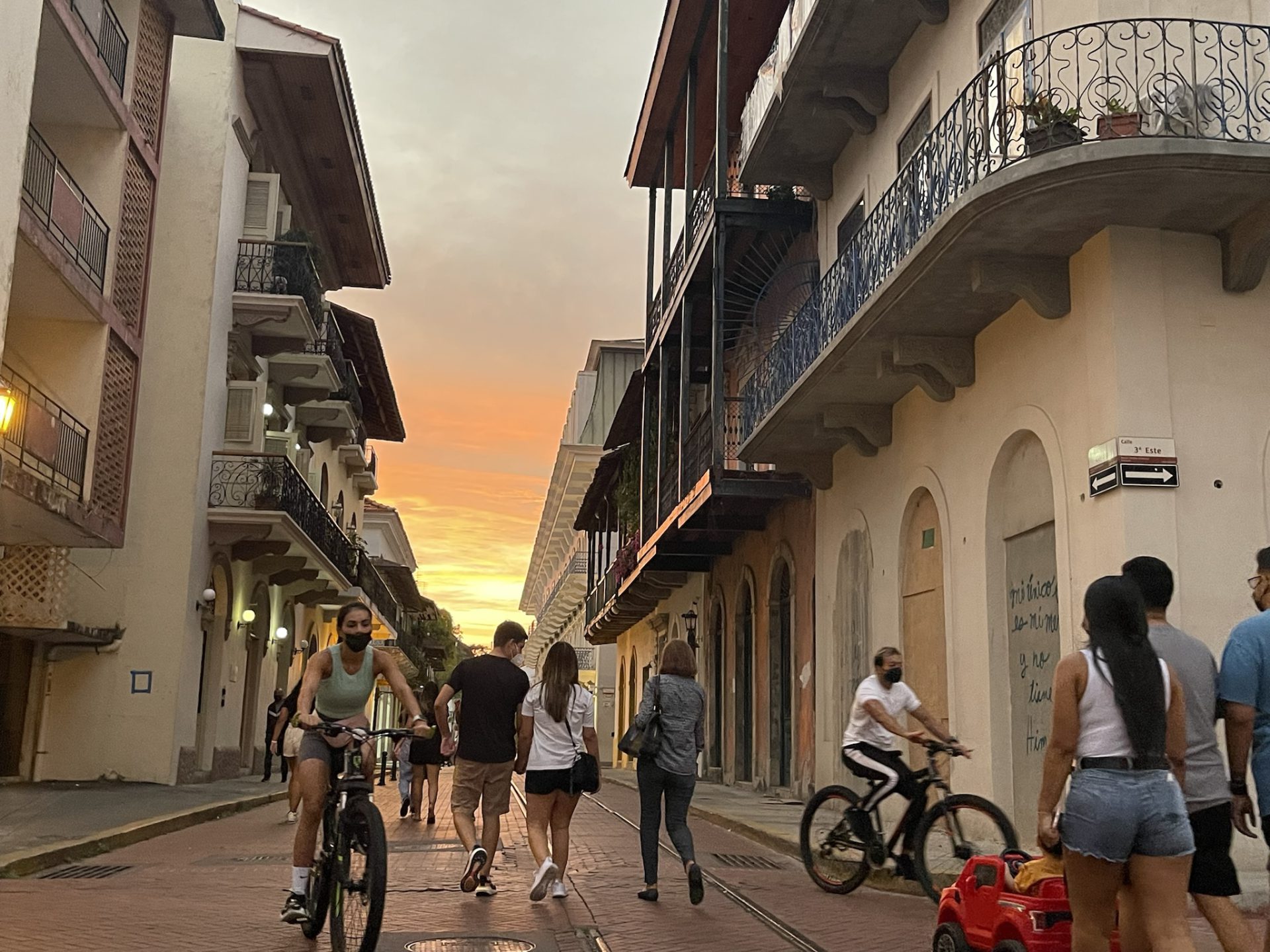Relocating to Panama? (or anywhere) read this first: Happy Expat
Panama, Casco Viejo, Casco Antiguo
This is the second article on relocating to Panama that we wrote (six years ago). We find it to be as relevant today as it was then. If you are thinking to relocate to Panama (or anywhere!) this is a must read. From head to toe!!!
The Happy Expat (Part II): Lifestyles for Happiness
— September 16, 2010 (omg…)
Casco Antiguo is my home, a history-steeped peninsula with a fortress at its tip, jutting into Panama Bay with a panoramic view of Panama City’s skyline in one direction, and Isla Tobago in the other. With its Old Panama atmosphere, its narrow bricked streets and variety of sights, sounds and people, it is an interesting place to study what makes for a happy expat.
As is the case in most places, expats drawn here start with common denominators. Most apparently, those who come to live in Casco Antiguo are virtually self-defined as eschewing the high-rise or golf club life available a short distance away, which draw their own compatible communities. This is a lively place, a walk-around neighborhood of plazas and restaurants where rundown and revitalized dwellings of three stories or less co-exist under a United Nations historic preservation designation. You are not lured into thinking a part of “back home” has been transplanted here, and it does not usually take long for a foreigner to make the “love it or leave it” decision. Yet while most who elect to stay remain happily, a few become disenchanted. As I have written before, the question that intrigues me, is why? Is it the experience or the individual that makes the difference?
On any block in Casco Antiguo, you may see laundry draped over the balcony of a century old dwelling next to a revitalized apartment house required by ordinance to keep its Old City touches, while work is underway on still another. About thirty restored apartments come on the market each year, most of which are purchased by foreigners, though two hundred or so expats still are just a small percentage of the Casco’s population of some 6000. My roles as a real estate broker and president of a neighborhood association make me (a Panamanian) constantly cognizant of our neighborhood’s human scale. As to expats, I come to know almost all of them, hence my opinions on what makes for a happy transplant.
As a group expats fascinate me, perhaps because I have been surrounded by them all my life: My parents were expats (both to and from Italy), I worked at the Smithsonian Tropical Research Institute in Panama with scientists from around the world, and my husband is from the States. As individuals, I am endlessly fascinated by expat backgrounds and talents. That little group of two hundred expats in Casco includes renowned scientists, private bankers, day traders, professional writers, energetic entrepreneurs right out of college, a working actor, quite a few globe trotting executives, at least two doctors, a director of a large NGO, the regional head of a famous luxury brand, a yoga instructor…the list goes on.
The great majority are extremely happy and I think that most will tell you that they could never see themselves returning to their home countries. In a recent survey of United Kingdom Expats, 71 percent said they thought they made the right decision, and I would have to guess that the number is not too different here.
Think about that for a second: accomplished people from big, highly-developed countries relocating to a small “third world” country for lifestyle. As a realtor, I met many such “successes” by telephone or email when they were first contemplating the move and was able to observe them through the process of deliberating, moving, making friends, becoming part of the community and then, finally, helping others to do the same.
In order to better counsel my clients who often become friends, I have tried to be analytical about what makes for a successful transition from a developed country to a developing country. In Part I of this article I wrote about things that all of the unhappy expats I have known had in common. But what about the vast majority who have flourished? They’ve built businesses, started families, made friends and in some cases fortunes. How do they do it?
No two are exactly alike (and that’s what makes it more art than science), but the four things that I think the happiest expats have in common are that they:
1. knew what they were seeking,
2. have good chemistry and are compatible with their new environment,
3. made an effort to adapt culturally, and
4. engineered a lifestyle they could not have found at home.
Know Thyself, Know Thy Destination
In Part I I mentioned that often expats fail in transitioning simply because they were not going to be happy anywhere. Whether they understood it or not, they were in essence trying to escape from themselves. The corollary to that is that most of the happy expats I know understand exactly why they left their home countries. In many cases there were positive reasons, such as searching for new opportunities, experiencing a new culture, accepting a new job, wanting a more active lifestyle, looking for a more central place to base their business or following a romance.
In other cases they reject certain things they know will be different in their adopted country. Whether it’s politics, economics or a desire to transcend the “same ole,” these are optimistic people who knew what they wanted in life and proactively looked for it.
I’m always amazed at how much I learn about my own country from new clients who come into my office armed with folders full of facts and figures. Clearly the information is helpful to making an informed decision, but my question to clients contemplating moving to my neighborhood is always the same: what are YOU looking for? The more specific and clear they are about their own priorities, the more confidence I have in recommending (or not recommending) my country.
Chemistry and Compatibility
In romance, great chemistry often starts through the eyes, but what makes two people truly compatible over the long run is how their personalities fit together; Same for expats and their adopted countries.
I haven’t met anyone who can sit in a cafe on Casco’s 300-year-old Plaza Bolivar and not fall in love with the beautiful architecture in about the time it takes to down a Mojito. But the ones who have great chemistry with the place notice and appreciate much more subtle things, like the sounds of children playing in the street or the weathered wooden building with it’s peeling paint patina on the far corner or the old wandering salesman who sells hot bollos for .25 cents. When a person focuses merely on the architecture and tells me how much “potential” the neighborhood has and then asks, “When do you think it will be finished?”, I pretty much know the fit isn’t right for the same reasons that I wouldn’t want my best friend to date someone who took that approach with her.
But beyond the initial chemistry is true compatibility. Every place has a character, an essence, and the more that your personality fits with that character the happier you are going to be there. If you are a Type A personality who needs everything ordered and a world that jumps at your command, the tropics probably aren’t for you no matter how much you love palm trees. To me the key is to simply take some time to focus on the imperfections of a place and ask yourself if they are deal killers. Easy to say, but until you get beneath the surface you won’t really know what its imperfections are.
Cultural adaptation
As anyone with a successful marriage will tell you, chemistry only takes you so far; at some point, relationships require work. At the risk of torturing the metaphor, I’d say the same goes for moving abroad, and that in both cases the work you put in is paid back many times over.
You can certainly survive in Panama with zero Spanish, but a 500 word vocabulary makes it so much more fun, and as a bonus, almost everything suddenly gets cheaper! The curiosity to find out why things are the way they are before jumping to how you think they should be is another great adaptation tool, and one that has the added benefit of getting you into a lot of interesting conversations. A good attitude which includes curiosity is about all that is required here.
The Well Engineered Lifestyle
Probably the greatest thing that moving abroad allows you to do is engineer a lifestyle that is right for you. If you move to a place that offers more of the things that are important to you than your home did–say waves if you are a surfer, freedom if you’re a libertarian, or parties if you’re a partier–you’re a long way towards finding happiness.
Lifestyle engineering is a whole topic unto itself and I plan to write another article with case studies of expats who have created unique “cosmotropical lifestyles” in the historic district. One of those case studies will certainly be clients of mine, three friends from California, who started a hotel and quickly figured out that it only took two of them to run it, so at any given time one of them is out on a two month travel. They’ve pretty much seen all of Latin America at this point. Traveling is their priority and they engineered a unique (and lucrative) lifestyle that would have been impossible for them to create back in California.
The key is prioritizing–the happiest expats I know have their priorities straight and have done the work to organize a lifestyle around those priorities in a way they couldn’t have where they came from.
Love for the underdog
One final thing I’ve noticed about the expats here is that quite a few seem to have a love for the underdog. I noticed this watching the world cup with a group of them because I was stunned to see that the group favorite was…Ghana? We Panamanians had been rooting for Brazil, Spain, Argentina, Italy–anyone we thought had a chance of making the finals, but all the expats were screaming their heads off for a team with no chance. I’m still puzzling this out, but somehow I think it wasn’t coincidence but rather a happy trait.
Moving from the developed world to the developing world is about more than lifestyle engineering. At some level expats are trading themselves to a new team–a scrappy up-comer with lots of opportunity and room for improvement, where a person coming from the outside with new ideas, energy and capital can be a meaningful contributor to a better future.
At the same time, they don’t have their expectations fixed on any definite result. Is Panama going to attain the tidy efficiency of a Switzerland in our lifetimes? About as likely as Ghana winning the World Cup (which is to say just possible enough to make it fun to watch). But the happy expat seems to understand that life is about the journey, not the destination. For them, watching little Ghana advance one round was infinitely more satisfying than rooting for the favorite Spain to win the World Cup–just like being a part of Panama’s little successes as it tries to make its way into the ranks of developed world countries.





